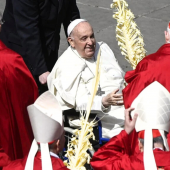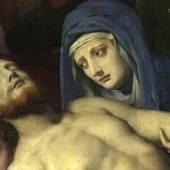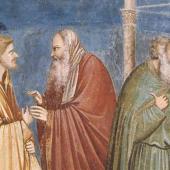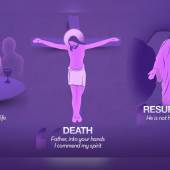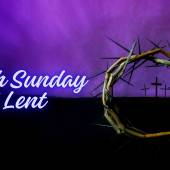We need to be vigilant in life not to Succumb to Temptations
Holy Week Tuesday: April 12, 2022
Isa 49:1-6/Psa 71:1-6, 15, 17/John 13:21-33, 36-39
Praise the Lord! Dear Sisters and Brothers in Jesus Christ,
Today is Tuesday of the Holy Week. Scholars believe that on this day 2000 years ago, Jesus was sitting in the Temple of Jerusalem especially in the place where the dumb boxes were kept for the people to make their donations. It is on this occasion that Jesus took note of the poor widow’s offering which foreshadowed Jesus’ own offering of himself on the cross. The poor widow offered all that she had while Jesus would do the same on Good Friday without any hesitation. In doing so, both the poor widow and Jesus, expressed their trust in God and fulfilled the plan of God for them.
Let us now see what the Word of God in today’s Liturgy tells us. There are four issues that I would like to highlight from the First Reading taken from the Book of Isaiah. In the first place, the reading speaks about the vocation story of the Suffering Servant. He is aware that God chose him and called him before he was born. God blessed him with the gift of tongue to preach and to teach.
Secondly, the Lord God tells the prophet that he is the Servant of the Lord in whom the Lord will be glorified. The author of the Letter to the Hebrews highlights this in 1:3, where he says that Jesus Christ “is the reflection of God’s glory and the exact imprint of God’s very being” and therefore the Suffering Servant could be identified not only with prophet Isaiah who is in Babylon with the exiled Israelites or the people of Israel themselves or even Jesus Christ the Son of God.
In today’s context, indeed every baptized is asked to live for God so that in the life of the chosen person God Himself will be glorified. There is no room for personal enhancement and glory. The “I” has no place. This could be summarized in the words of St. Paul who said in Gal 2:20, “…it is no longer I who live, but it is Christ who lives in me”.
The third point of our discussion is that the prophet feels that he has toiled in vain and he has exhausted himself for nothing. It is very common that all of us and even the chosen women and men feel disgusted and discouraged when the going gets tough due to internal, external circumstances or when the political, religious and economic situations turn hostile. It is heartening to notice that the prophet himself realizes that the Lord God will reward him and honour him once he courageously faces all these difficulties.
In case the prophet feels that he or she is doing very well and is quite happy like a frog in the well, the Lord God reminds the chosen one saying that it is not enough for him/her to be God’s servant to restore the tribes of Jacob and bring back the survivors of Israel; the prophet has to become the light of the nations so that God’s salvation may reach to the ends of the earth. By promising to make the prophet a light to the nations, the Lord God reveals that He is not the monopoly of the Israelites alone but He is the God of the Universe. The whole universe belongs to Him. Jesus too participates in the Mission of God. No wonder then as to why Jesus asked his disciples to go the ends of the earth to proclaim his name as we read in Matt 28:16-20.
The Gospel Reading paints the picture of Jesus at the Last Supper in the company of the disciples. It is the scene of Maundy Thursday but the emphasis is on what is going to happen in the night after the Supper is over. Jesus reveals that one of the Twelve will betray him. The disciples are shocked. Peter gets disturbed and he asks John the Beloved Disciple to intervene and enquire from Jesus as to who will do that unfortunate action. Jesus heightens their excitement by not revealing the name but indirectly discloses: ‘the one to whom I give the piece of bread that I shall dip in the dish’.
My dear Sisters and Brothers in Jesus Christ, it is overwhelmingly shocking to realize that the piece of bread pronounced as the flesh of Jesus, dipped in the blood of Jesus and given by Jesus himself turns out to be a Satan the moment Judas Iscariot receives it. And when Judas goes out of the dinner table it was night. Darkness was ruling the night, indicative of the rule of the Satan. The disposition of the person who receives is capable of turning the precious Body and Blood of Jesus into a Satan. The moment of the Passion of Jesus that follows may look a moment of defeat for Jesus but in the eyes of God, it is a moment of glorification. The sufferings and pains that the chosen people go through can be turned into moments of glory if they persevere in silence and offer everything to God as Jesus did.
Our reflections for this day will remain incomplete if we don’t analyse the role of St. Peter in today’s gospel reading. In the first place, he wanted to know who will betray the Master. In the second place, he is making a promise that he will lay down his life for Jesus. And now the Lord reveals that he will deny him three times on the night of Maundy Thursday.
Instead of reading this Gospel on Maundy Thursday, Holy Mother Church gives us an opportunity to listen to it already today itself so that we can concentrate on the betrayal of Judas Iscariot and denial of Peter today itself. It is clear that we will have other points to meditate upon on Maundy Thursday.
It may not be farfetched to think that Jesus in his anxiety revealed what Judas Iscariot and Peter are expected to do and expecting them to change their minds is against the will of God. May be! But it was not supposed to be! The Holy Scriptures had to be fulfilled or rather the words of Jesus must be accomplished. One thing is certain. We too can fail like these two disciples of Jesus if we are not connected to Jesus all the time. We need to be vigilant in life not to succumb to temptations.
Let us pray that we may allow the grace of God remain in our life so that we may be ready to travel with Jesus to Jerusalem and die with him in order to rise again. Amen!
Radio Veritas Asia (RVA), a media platform of the Catholic Church, aims to share Christ. RVA started in 1969 as a continental Catholic radio station to serve Asian countries in their respective local language, thus earning the tag “the Voice of Asian Christianity.” Responding to the emerging context, RVA embraced media platforms to connect with the global Asian audience via its 21 language websites and various social media platforms.









